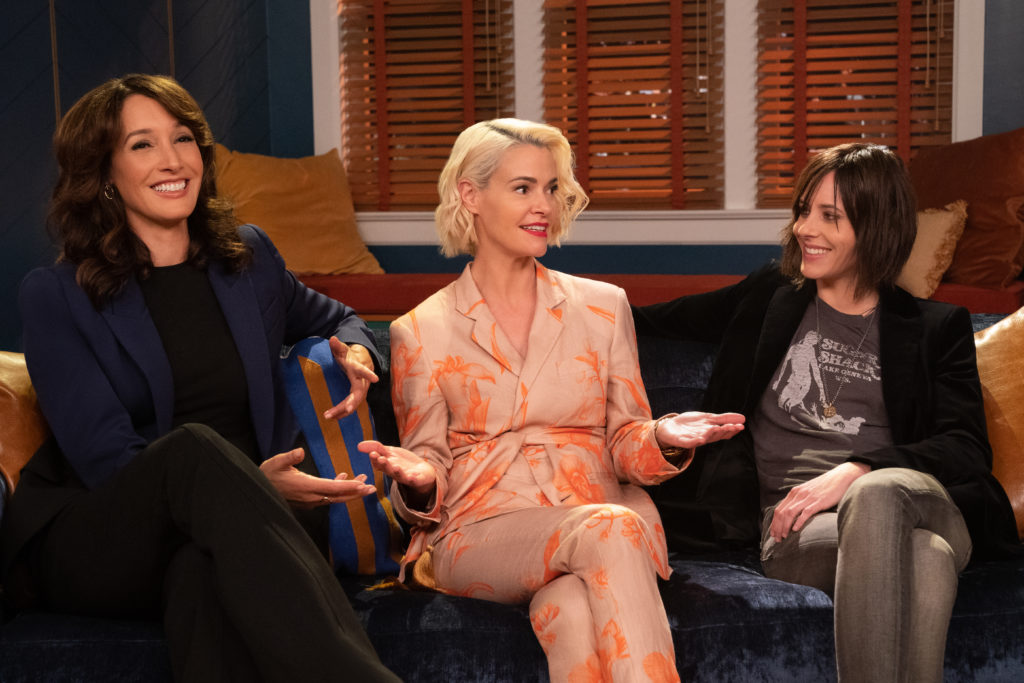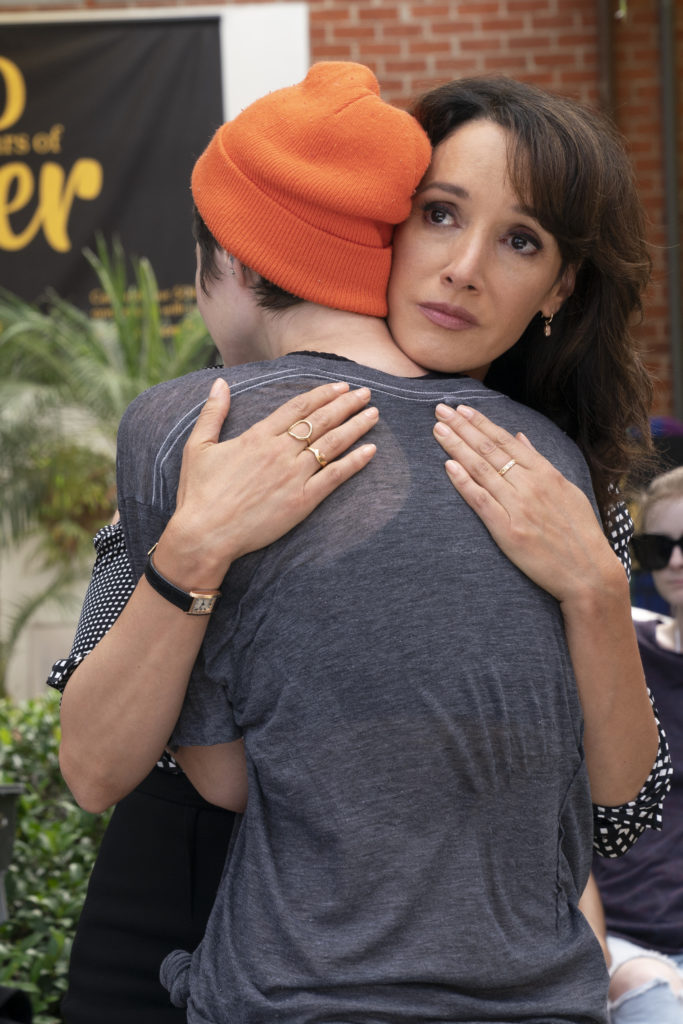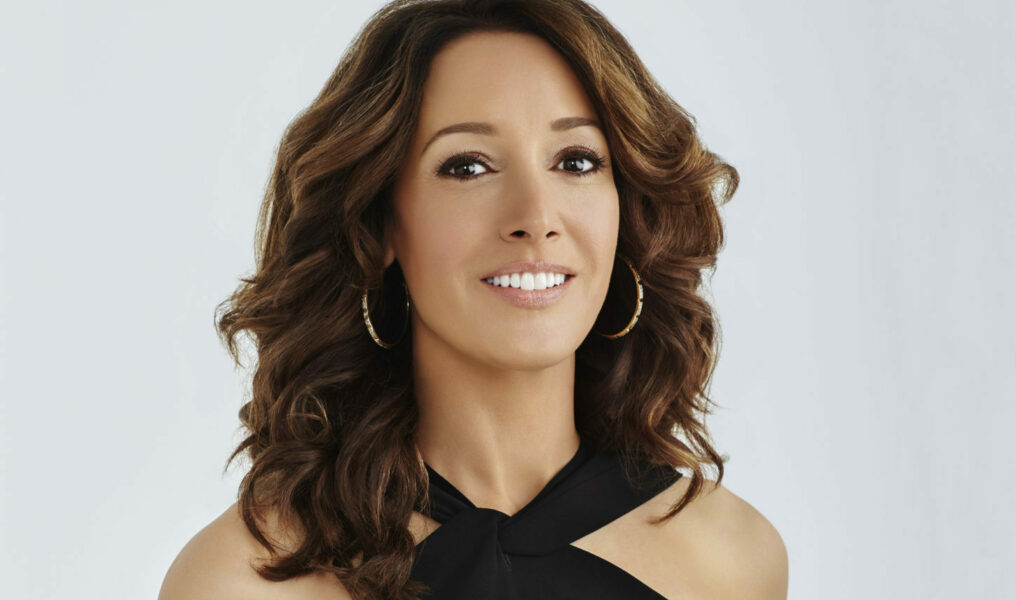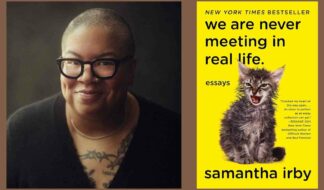When Jennifer Beals speaks to the universe, the universe listens. Or at least it did this one time while the 55-year-old actress was on a hike. She can't recall the exact year, but it was sometime between 1999 and 2002 when she got down on her knees in the middle of a trail and asked for a "great love story."
Beals got that love story. Granted, she also got fighting and cheating and custody battles, but the universe still delivered her a great love, which just so happened to be a lesbian love. And the show, "The L Word," which ran from 2004-2009 for six seasons, changed the landscape for lesbian women in mainstream culture with a show dedicated to their lives for the first time ever. The series took on important LGBTQ topics such as "don't ask, don't tell," same-sex adoption and coming out as transgender. And in 2012, Beals, one of the series' leading stars, was presented with the Human Rights Campaign's Ally for Equality Award for her support of the LGBTQ community.
Ten years after it wrapped, "The L Word" returns Dec. 8 to Showtime with an extended title, "The L Word: Generation Q," and a new, more diverse cast who are starring alongside original cast members and current executive producers Katherine Moennig, Leisha Hailey and Beals. For the eight-episode revival, Beals reprises her role as Bette Porter, now running for mayor of LA.
When Beals, who has been called an icon, a dykon and an honorary lesbian, calls me one recent afternoon, I acknowledge her zen disposition in the interview clips I've watched in preparation for our talk. How does she manage to keep so calm? "It's so funny because I just got finished with a two-hour hike," she says, breaking into a laugh. "But I think hiking is really helpful."
Indeed, it seems to be doing the trick.
You went into the original "L Word" hoping that maybe you'd reach someone who needed to see themselves reflected on screen. For this revival, what was the driving force to get these characters back on TV?
Quite early on, as early as, gosh, 2012, Kate, Leisha and I became aware that "The L Word" was still being discussed on social media and in chat rooms, and that there was still a hunger for these stories but perhaps in a newer form because there was a paradigm shift happening within the queer community where a whole new generation was refusing to let other people define them, and those definitions were outgrowing any kind of lexicon that we had. And so it was at that time that we approached (series creator) Ilene Chaiken about resurrecting the show in a new form, and she was busy with a little show called "Empire" (laughs) but was very excited about the idea. And the more we learned about the stories of this newer generation, the more excited we became about being able to tell those stories and making our cast more inclusive and more diverse.
Despite breaking ground, the original show was criticized for not being inclusive.
And, honestly, there will be criticism of this version, because the community is outpacing pop culture in exponential ways. That criticism is important to hear and to take in and to figure out how and where we can do better.
How did the criticism from the original show shape the revival?
I think the most important things were to have trans actors playing trans roles and to make it more inclusive racially.
The bisexual community also felt like they weren't fairly represented.
Right. And the fact is it's not humanly possible to tell everyone's story right away. But we hope as the years go on that we will be able to be as inclusive as possible. In the meantime, I encourage everyone to write their story and try to get it made. I think that's also really important.
Going back, what was your experience with the LGBTQ community before "The L Word"?
Oh my gosh, I knew nothing! I knew nothing! I am still by far the most square cast member. Like, Kate still makes fun of me because my playlists are so square.
Your music playlists?
Yeah. Because I stay with her sometimes and she's an amazing DJ and my playlists have, admittedly, some Top 40 influences in there (laughs), and she just cringes when she hears them. So I have to get permission to play my playlist. (Laughs.)
She's queering your playlist then?
She hasn't yet (laughs). I should ask her to do it, that would be a good thing. And it's not even queering the playlist; it's just making it a little bit more robust. It's either stuff from the '40s or chants or, all of a sudden, it's Post Malone. It's sort of just crazy, with a healthy dose of Joni Mitchell.
I mean, you could say Joni Mitchell has some lesbian currency.
OK! All right! I feel better now. I do feel better. What about Rickie Lee Jones?
Rickie Lee Jones is not on my radar, so I'm sorry, I cannot qualify that.
(Laughs.) OK, I'll pretend I never asked.

While we're on this topic: Having learned about dental dams during the original "L Word," are you still learning new things about the LGBTQ community with this latest iteration?
I always am learning, frankly. And the language is changing so fast that I'm trying to keep up with it. It's important, not necessarily that certain labels or sayings or qualifications will remain, but sometimes it feels like language is an inadequate repository for things that are so fluid and so fast-moving. It's like trying to quantify a stream that's flowing by you so quickly.
Jennifer, that's so poetic.
I was just hiking, so you know, that's where that comes from. (Laughs)
I agree with you, and I think that's the direction the queer community has moved into: into a more fluid environment.
Yes, and it's incredibly exciting to me. It's incredibly exciting to me when language can't keep up. It tells you that we're at a fulcrum of change that's tremendously exciting, and as a cis, straight woman where I have to come from always is a) that I have a tremendous responsibility being so lucky to be chosen to play this part and b) that the intersectionality of these stories is always love. Our desire to be loved and to love in the way in which we choose is the thing that connects all of us and that I can relate to deeply. And I can relate to otherness deeply.
How did you tap into your otherness at the beginning of "L Word"?
Apologies that you were looking at interviews ad nauseam, but I tell the story of preparing for the pilot and I had been focusing, really, on what it was like to be a curator, to be a gallerist, in that world: I was at a restaurant with my husband and he turned to me and he kissed me. It just was like an epiphany, where it dawned on me that if we had been a gay couple that that event would've been monumental in this particular restaurant. It really pained me.
As a straight woman, were you scared of taking on a lesbian role?
No, because there was no conversation about that at the time. Zero. Any fears that people talked about was the other way, of what it would do to your career. And I had no fear about that; I didn't even really consider it. I just thought, "Look at this gift I've been given; it's an extraordinary part that's layered and complicated and complex." Frankly, I had been hiking, gosh, I don't remember what year it was – maybe 2000, maybe 1999, maybe 2002. I can't remember. I'm gonna have to look it up. But I was hiking and I was trying to communicate to the universe what I wanted and I said, "Please, I want to be in a great love story. I want to be in a grand, historic, iconic love story," and I literally got down on my knees on the trail and said, "Please." Because it was something I felt like I hadn't really had yet and that would be meaningful, not only to me but perhaps to other people, as all love stories are.
And of course, I gave it to the universe and it handed me back my request in an even more extraordinary package of playing in an iconic, wonderful, lesbian love story. And it was fantastic. It was more than I even knew what to ask for. And I'm incredibly grateful. And it was only a couple months later; it was a choice between "The L Word" and another show. I was sent two scripts and they asked me to choose between the two parts, and then they asked me to choose between ("L Word" character) Tina (Kennard) and Bette.
It fascinates me that you didn't know you had a lesbian following until "The L Word" given "Flashdance" and your iconic water scene. How did you not know?
Well, because I never… I'm not… there was no social media! And like, I wasn't part of the community, so I never really was privy to those conversations. And I was in college in my own little bubble, studying, and, you know, running around town.
And, evidently, not going to lesbian bars.
But I did go to a lesbian bar once! I was in a (1992) film called "In the Soup" – I think it was "In the Soup" – and we had a lesbian assistant director who had an amazing pair of leather pants and I said, "Where did you get those leather pants?" She named some place in Germany and I was like, "OK." She goes, "But if you go with me to the" – oh, god, what the hell is the name of the place I want to say? Pink Pussycat or something like that.
Sounds very lesbian.
(Laughs.) "If you go with me to the Pink Pussycat, I'll give them to you!" I'm like,
"Done. That's so easy." So I went to the bar in I want to say the East Village or Alphabet City – somewhere like that – and it was really uneventful. I mean, in some ways like a heteronormative bar in that you have girls, they're scantily clad, dancing in cages or on things or whatever, and then you just had a bunch of women drinking. It wasn't… I don't know what I expected it to be! But it wasn't as transgressive as maybe I had imagined it might be (laughs). But I got the leather pants! (Laughs.) I was really excited!
Did you wear the leather pants?
Yes … but they didn't fit me very well! I mean, I just don't look good in leather pants. That's just a fact.
Most people don't.
My husband looks much better in leather pants than I do.
So the moment you stepped onto the set of "Generation Q," you're in LA with co-stars that you've worked with for many years who maybe you hadn't seen regularly. What did it feel like to be back with them and back on the set?
Well, we had seen each other regularly because we had been plotting and scheming to get the show back on the air for years and years and years, and I was at Kate's house quite regularly when I would come to Los Angeles and we could see Leisha, and the three of us would spend time together. But what was surreal was seeing us in the wardrobe and the manifestation of our characters; that was really quite surreal. And Ilene came to visit that day too, so it was really intense.
Your queer fans will appreciate that you're executive producing an adaptation of Taylor Jenkins Reid's critically acclaimed novel "The Seven Husbands of Evelyn Hugo" for Freeform with Ilene. From what I've read, it all seems very queer. Were its LGBTQ themes a draw for you?
Well, it's funny how it came about: I had just finished playing Margo Taft in (the Amazon Studios series) "The Last Tycoon," which is my favorite part that I've ever played. It was so much fun. And I really missed her. Like, I had a palpable ache of missing this person, and I was at dinner with my friend and I was talking to her about it and telling her about the character because the show hadn't aired yet and she said, "Oh, it sounds so much like ‘Evelyn Hugo,'" and I said, "What's ‘Evelyn Hugo'?" and she said, "My friend Taylor just wrote this new book; it's not out yet but I think you'd be really interested in it. It's sort of a similar idea." I said, "Please, please, please, can I read it? I just want to visit with someone who's even like Margo." So I got a hold of Taylor and she was kind enough to send me an advanced reader copy and I fell in love with it. It had a lot of similar themes that Margo had, but it was like a Margo Taft and "L Word" mashup. (Laughs.) And yeah, it definitely has a lot of queer themes in there.

Could you talk about the relevancy of "The L Word" in its respective political moment, then and now?
It's really interesting. In 2004, Bush was president and there were no comprehensive legal protections covering gender or sexual orientation, and there aren't now either. But then there was "The L Word" that challenged this heterocentrist view of the world, which was exciting. And now here we are in 2019 with an administration that, from the moment they took office, was attacking the LGBTQ community. It was an assault. And as the returns were coming in in 2015, Ilene and I were texting one another, trying to figure out what we can do. And on November 18, we got together and dedicated ourselves to bringing "The L Word" back, because we knew at that point visibility would be even more important. Because when you're under attack, visibility, while it's not everything, brings a certain amount of agency and a certain amount of community and can also help shift paradigms in terms of the parasocial interaction, so we knew it would be important. I think somebody called it "the discrimination administration."
This couldn't be a better time, then, to have Bette run for openly lesbian mayor of LA. And she's outspoken about many issues, including curbing the opioid crisis.
But she is also her own worst enemy. That's been her way all the time. That's one thing she hasn't quite mastered. (Laughs.)
If you were an out lesbian mayor, what issues would be first on your agenda?
I would really want to push the Equality Act. I think that's the most important thing right now. That and education. Making sure that schools are safe.
That's great. Now we just gotta get you in. Jennifer Beals for office.
(Laughs.) Never! Never in a bazillion years!











